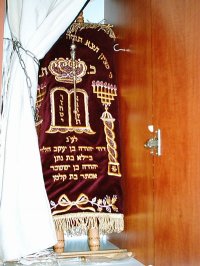The Kotel ("Wailing wall") is the Western retaining wall of the Temple Mount where the Bet Hamikdash (Temple) stood until it was destroyed over 1,900 years ago.
The Kotel "plaza" is outside the Temple Mount. Every prayer of ours - Amida and Birkat Hamazon - includes a supplication to once again be able to serve Hashem on the other side of the Kotel; from inside the rebuilt Bet Hamikdash.
When seeing the place where the Bet Hamikdash stood, one needs to do Kri'a; tear one's clothes in the same way that mourners do.
One only needs to tear Kri'a if one hasn't been in Jerusalem for more than 30 days.
Source: Shulchan Aruch, Orach Chaim 561
The prevalent Yerushalmi custom is to not tear Kri'a on days one doesn't say Tachanun, including Friday afternoons.
- Danny
Sunday, 28th day of the Omer, Yom Yerushalayim, 5779
הָרוֹאֶה עָרֵי יְהוּדָה בְּחֻרְבָּנָן אוֹמֵר: עָרֵי קָדְשְׁךָ הָיוּ מִדְבָּר, וְקוֹרֵעַ וְאֵינוֹ חַיָּב לִקְרֹעַ אֶלָּא כְּשֶׁמַּגִּיעַ סָמוּךְ לָהֶם כְּמִן הַצּוֹפִים לִירוּשָׁלַיִם
רוֹאֶה אֶת יְרוּשָׁלַיִם בְּחֻרְבָּנָהּ, אוֹמֵר: צִיּוֹן הָיְתָה מִדְבַּר שְׁמָמָה וְקוֹרֵע; וּכְשֶׁרוֹאֶה בֵּית הַמִּקְדָּשׁ, אוֹמֵר: בֵּית קָדְשֵׁנוּ וְתִפְאַרְתֵּנוּ אֲשֶׁר הִלְלוּךָ (בּוֹ) אֲבוֹתֵינוּ הָיָה לִשְׂרֵפַת אֵשׁ וְכָל מַחְמָדֵנוּ הָיָה לְחָרְבָּה, וְקוֹרֵעַ. וּמֵהֵיכָן חַיָּב לִקְרֹעַ, מִן הַצּוֹפִים; וְאַחַר כָּךְ כְּשֶׁיִּרְאֶה הַמִּקְדָּשׁ קוֹרֵעַ קֶרַע אַחֵר, וְכָל קְרִיעָה טֶפַח; וְאִם בָּא דֶּרֶךְ הַמִּדְבָּר, שֶׁאָז רוֹאֶה הַמִּקְדָּשׁ תְּחִלָּה, קוֹרֵעַ עַל הַמִּקְדָּשׁ, טֶפַח, וְאַחַר כָּךְ כְּשֶׁיִּרְאֶה יְרוּשָׁלַיִם מוֹסִיף עַל קֶרַע רִאשׁוֹן כָּל שֶׁהוּא
אִם קָרַע עַל אַחַת מֵעָרֵי יְהוּדָה, אֵינוֹ חוֹזֵר וְקוֹרֵעַ כְּשֶׁיִּרְאֶה שְׁאָר עָרֵי יְהוּדָה; חוּץ מִירוּשָׁלַיִם, שֶׁחוֹזֵר וְקוֹרֵעַ עָלֶיהָ קֶרַע אַחֵר בִּפְנֵי עַצְמוֹ; וְאִם קָרַע עַל יְרוּשָׁלַיִם תְּחִלָּה, אֵינוֹ צָרִיךְ לִקְרֹעַ עַל שְׁאָר עָרֵי יְהוּדָה.
כָּל הַקְּרָעִים הָאֵלּוּ בְּיָדוֹ וּמְעֻמָּד, וְקוֹרֵעַ כָּל כְּסוּתוֹ שֶׁעָלָיו עַד שֶׁיְּגַלֶּה אֶת לִבּוֹ, וְאֵינוֹ מְאַחֶה קְרָעִים אֵלּוּ לְעוֹלָם; אֲבָל רַשַּׁאי לְשָׁלְלָן, לְמָלְלָן, לְלַקְּטָן וּלְתָפְרָן כְּמִין סֻלָּמוֹת
הָיָה הוֹלֵךְ וּבָא לִירוּשָׁלַיִם, הוֹלֵךְ וּבָא תּוֹךְ ל' יוֹם, אֵינוֹ קוֹרֵעַ קֶרַע אַחֵר; וְאִם לְאַחַר ל' יוֹם, חוֹזֵר וְקוֹרֵעַ וְהוּא הַדִּין בְּעָרֵי יְהוּדָה וּבַמִּקְדָּשׁ


